- Home
- Brand, Max
Bull Hunter Page 3
Bull Hunter Read online
Page 3
Uncle Bill was no longer silent. The moment the big hand of his nephew closed over his leg he launched a stream of curses that chilled the blood and drove his own sons farther back into the shadow of the corner. He demanded that they stand forth and tear Bull limb from limb. He disinherited them for cowardice. He threatened Bull with a vengeance compared with which the thunderbolt would be a feeble flare of light. He swore that he was entirely capable of taking care of himself, that he would step down into his grave sooner than be nursed and petted by any living human being.
All the while, the great Bull leaned impassively over the wounded man and finally worked the boot free. That was not all. Uncle Bill had slipped over until he could reach a billet of wood beside his bunk. He struck at Bull's head with it, but the stick was brushed out of his palsied fingers with a single gesture, and, while Uncle Bill groaned with fury and impotence, Bull continued the task of preparing him for bed. He straightened the old body of the terrible Campbell; he heated water in the tub and washed away stains and dirt; he took off the stained bandages and replaced them with clean ones.
His cousins helped in the latter part of this work. Weakness had reduced Uncle Bill to speechlessness. Finally the head of Bill Campbell was laid on a double fold of blanket in lieu of a pillow. A pipe had been tamped full and lighted by Bull and-crowning insult-set between Bill's teeth. When all this was accomplished Bull retired to his corner, picked up his book, and was instantly absorbed.
In the hushed atmosphere it seemed that a terrible blow had fallen, and that another was about to fall. Harry and Joe were as men stunned, but they looked upon their father with a gathering complacency. They had found it demonstrated that it was possible to disobey their father without being instantly destroyed. They were taking the lesson to heart. And indeed old Bill Campbell himself seemed to be slowly admitting that he was beaten.
The illusion of absolute self-sufficiency, which he had built up through the years for the sake of imposing upon his sons and Bull Hunter, was now destroyed. At a single stroke he had been exposed as an old man, already beaten in battle by a foeman and now requiring as much care as a sick woman. The shame of it burned in him; but the comfort of the smoothed bunk and the filled pipe between his teeth was a blessing. He found to his own surprise that he was not hating Bull with a tithe of his usual vigor. He began to realize that he had come to the end of his period of command. When he left that sickbed he could only advise.
As a king about to die he looked at his heirs and found them strong and sufficient and pleasing to the eye. Nowhere in the mountains were there two boys as tall, as straight, as deadly with rifle and revolver, as fierce, as relentless, as these two boys of his. He had sharpened their tempers, and he rejoiced in the sullen ferocity with which they looked at him now, unloving, cunning, biding their time and finding that it had almost come. But he was not yet done. His body was wrecked; there remained his mind, and they would find it a great power. But he did not talk until the lights had been put out and the three youths were in their separate bunks. Then, without the light to show them his helpless body, in the darkness, which would give his mind a freer play, he began to tell his story.
It was a long narrative. Far back in the years he had prospected with a youth named Pete Reeve. They had located a claim and they had gone to town together to celebrate. In the celebration he had drunk with Reeve till the boy stupefied. Then he had induced Reeve to gamble for his share of the claim and had won it. Afterward Pete swore to be even with him. But the years had gone by without another meeting of the men.
Only today, riding through the mountains, he had come on a dried-up wisp of a man with long, iron-gray hair, a sharp, withered face, and hands like the claws of a bird. He rode a fine bay gelding, and had stopped Bill to ask some questions about the region above the timberline because he was drifting south and intended to cross the summits. Bill had described the way, and suddenly, out of their talk, came the revelation of their identities-the one was Bill Campbell, the other was Pete Reeve.
At this point in the story Bull heaved himself slowly, softly up on one arm to listen. He was beginning to get the full sense of the words for the first time. This narrative was like a book done in a commoner language.
* * *
There was more snow on this side, and to travel through it he soon found that he must put on the snowshoes again; but after that the descent was actually restful compared with the labors of the climb. Yonder was the dark streak of the timberline again. Far down the valley he watched it curving in and out along the mountainside like a water level. Below was the darkness of the forest where other things lived, and where Bull could live more easily, also. Never had trees seemed such beautiful and friendly things to him.
Once a thought stopped him completely. He was in a new world. He was seeing everything for the first time. On other days he had gone out with others. Under their guidance, not trusted to undertake an expedition by himself, he looked at nothing until it was pointed out to him, heard nothing that was not first called to his attention. He had always wondered at the acuteness of the senses of all other men. But now, looking on the mountains for himself, he decided, with a start of the heart, that they were beautiful-beautiful and terrible at once, with the reality that he had never found in his books. What leveled spear of a knight, in the pages of romance, could equal the invisible thrust of this wind?
He reached the timberline. Looking back, he saw the summit, a brilliant line of white against a blue sky. Again the heart of Bull Hunter leaped. Here was a great treasure that he had taken in with one grasp of the eyes and which he could never lose!
He turned down the valley. Where it swerved out into the lower plain, stood Johnstown, and there he was to cross the flight of Pete Reeve, if Pete were indeed flying. But it was incredible that the man who had struck down Uncle Bill Campbell should flee from any man or number of men.
He had reached the bottom of the narrow valley. A dull noise came down to him from the mountain in the lull of the wind. He looked up.
Far away, miles and miles, near the summit of Scalped Mountain, a snaky form of mist was twisting swiftly down. He looked curiously. The thing grew, traveling with great speed that increased with every moment. It increased-it gained velocity-a snowslide!
He watched it in doubt. It was twisting like a snake down the farther side of the mountain, but, in his experience, slides were as treacherous as serpents. Bull started hastily for a low cliff that stood up from the floor of the valley, clear of the trees.
He had not gone far when the wind fell away to a whisper, and a dull roaring caught his ear. He looked back over his shoulder in alarm. A great wall of white was shooting down the mountainside. The little slide of surface snow, which had twisted across the surface of the old snows of the winter, had been gaining in weight, in momentum, picking up claws of shrubbery, teeth of stone, and eating through layer after layer of the old snow, packed hard as ice. Now it was a roaring mass with a front steadily increasing in height, and far away in the rear it tossed up a tail of snow dust, a flying mist that gave Bull an impression of speed greater than the main wall of the snow itself.
The noise grew amazingly, and coming in range of the opposite wall of the valley, a low and steadily increasing thunder poured into the ears of Bull. It was a fascinating thing to watch, and at this distance to the side he was quite safe. But at the very moment that he reached this decision, the front of the slide smashed with a noise like volleyed canyon against the side of a hill, tossed immense arms of white in the air, floundered, and then veered with the speed of an express train rounding a curve and rocked away down the slope straight for Bull. Turned cold with dread, he saw it hit the timberline with a great crashing, and the dark forms of the trees were dashed up by the running mass of stones and then swallowed in the boiling front of the slide.
He waited to see no more, but dashed on for the saving cliff. Once his back was turned it seemed that the slide gained speed. The immense roaring literally leaped
on him from behind, and in the roar, his senses were drowned. He could feel his knees weaken and buckle, but the cliff, now just before him, gave him fresh strength. But was the cliff high enough? He hurried up to higher ground and flung himself prostrate. The front of the slide was cutting down the heavily forested slope as though the trees were blades of grass before a keen scythe. The noise passed all description.
Once he thought the mass was changing direction. It put out a massive arm to the left, licked down five hundred trees at a gulp, and then, smashing its fist into a hillside, flung back into the valley floor, tossing the great trees in its top and poured straight at him. He watched it in one of those dazes during which one sees everything. The whole body came like water down a chute, but one part of the front wall spilled out ahead and then another, and then the top, overtaking the rest, toppled crashing to the bottom. And so it rushed out of sight beneath the cliff. But would it wash over the top?
The first answer was an impact that shook the ground under him, and then he heard a noise like a huge ripping explosion. A dozen lofty geysers of snow streamed up into the air, dazzling against the sun, misty at the edges of each column, whose center was solid tons and tons of snow. Old pines and spruces, their branches shaved away in the tumult of the slide, were picked up and hurled like javelins over the cliff; a shower of fragments beat on the body of Bull; and then the main mass of snow washed up over the edge of the cliff in a great mound, and the slide was ended.
He crawled slowly back to his feet. Far up the mountainside, beginning in a point, the track of the slide swept down in a broadening scar, black and raw, across forest and snow. Far down the valley the last echoes of thunder were passing away to a murmur, and the valley floor, beneath the cliff, was a mass of snow and tree trunks.
Bull took off the snowshoes and climbed along the valley wall until he could descend to the clear floor beneath him. Then he headed down toward Johnstown.
It was well past midday when he escaped the slide; it was the beginning of night when, at the conclusion of that first heroic march, he reached Johnstown. With hunger his stomach cleaved to his back, and his knees were weak with the labor.
Stamping through the snow to the hotel he asked the idlers around the stove, "Has any of you gents seen a man named Pete Reeve pass through this town?"
They looked at him in amazement. He had closed the door behind him, and now, with his battered hat pushed high on his head, he seemed taller than the entrance-taller and as wide, a mountain of a man. The efforts of the march had collected a continual frown on his forehead, and as he peered about from face to face, no one for a moment was able to answer, but each looked to his companion.
It was the proprietor who answered finally. Talk was his commercial medium and staff of life. "What sort of a looking man, captain?"
Bull blinked at him. He was not used to honorary epithets such as this, and he searched the face of the proprietor carefully to detect mockery. To his surprise the other showed signs of what Bull dimly recognized as fear. Fear of him-of Bull Hunter!
"The way you look at me," said the other and laughed uneasily, "I figure it's pretty lucky that I ain't this here Pete Reeve. That so, boys?"
The boys joined in the laughter, but they kept it subdued, their eyes upon the giant at the door. He was leaning against the wall, and the sight of his outspread hand was far from reassuring.
But Bull went on to describe his man. "Not very big; hands like the claws of a bird's; iron-gray hair; quick ways." That was Uncle Bill's description.
"Sure he's been here," said the owner. "I recognized him right off. He was through about dusk. He came over the mountains and just got past the summit, he said, before the storm hit. Lucky, eh?" He looked at the battered coat of Bull. "Kind of appears like you mightn't of been so lucky?"
"Me?" asked Bull gently. "Nope. I was at the timberline on the other side about daybreak today."
There was a sudden and chilly silence; men looked at one another. Obviously no man could have traveled that distance between dawn and dark, but it was as well not to express disbelief to a man who could tell a lie as big as his body.
"I got to eat," said Bull.
The proprietor jumped out of his chair. "I can fix you up, son."
He led the way, Bull following with his enormous strides, and, as the floor creaked under him, the eyes of the others jerked after him, stride by stride. It was beginning to seem possible that this man had done what he said he had done. When the door slammed behind him and his steps went creaking through the room beyond, a mutter of a hum arose around the stove.
As a matter of fact it was the beginning of the great legend that was finally to bulk around the name of the big man. And it was fitting that the huge figure of Bull Hunter should have come upon the attention of men in this way, descending out of the storm and the mountains.
That he had done something historic was far from the mind of Bull as he stalked into the dining room.
"You sit right down here," his host was saying, placing a chair at the table.
Bull tried the chair with his hand. It groaned and squeaked under the weight. "Chairs don't seem to be made for me," he said simply. "Besides I'm more used to sitting on the floor." He dropped to the floor accordingly, with the effect of a small earthquake. The proprietor stared, but he swallowed his astonishment. "What you'd like to eat is something hearty, I figure."
"What you got?" said Bull.
"Well, Mrs. Jarney come in this morning with a dozen fresh eggs. Got some prime bacon, too, and some jerky and-"
"That dozen eggs," said Bull thoughtfully, "will start me, and then a platter of bacon, and you might mix up a bowl of flapjacks. You ain't got a quart or so of canned milk, partner?"
The proprietor could only nod, for he dared not trust his voice. Fleeing to the kitchen he repeated the prodigious order to his wife. Then he circled by a back way and communicated the tidings to the "boys" around the stove.
"A couple of dozen eggs, he says to me, and a few pounds of beef and three or four quarts of milk and a bowl of flapjacks and a platter of bacon," was the way the second version of the historic order for food came to the idlers.
Half a dozen of the men risked the cold and the wind to steal around to the side of the house and peer through the window at the huge, bunched figure that sat on the floor. They found him with his chin dropped upon the burly fist and a frown on his forehead, for Bull was thinking.
He would have been glad to have found Pete Reeve in Johnstown and have the matter over with. But, after all, it was beginning to occur to him that it might not be wise to kill the man in the presence of other people. They might attempt to correct him with the assistance of a rope and a limb of a tree. Somewhere he must cut in ahead of this Reeve and start out at him if possible. As for his ability to keep pace with a horse he had no doubt that he could do it fairly well. More than once he had gone out on foot, while Harry and Joe rode, and he had pressed the little ponies, bearing their riders slowly up and down the slopes, to keep pace with him. On the level, of course, it was a different matter, but in broken country he more than kept up.
"Have you got a grudge agin' Reeve?" asked the host, as he brought in the fried eggs.
"Maybe," admitted Bull, and instantly he began to attack the food.
The proprietor watched with a growing awe. No chinook ever ate snow as this hungry giant melted food to nothingness. He came back with the first stack of flapjacks and bacon and more questions. "But I'd think that a gent like you'd be pretty careful about tangling with Pete Reeve-him being so handy with a gun and you such a tolerable big target."
"I've figured that all out," said Bull calmly. "But they's so much of me to kill that I don't figure one bullet could do the work. Do you?"
The eyes of the proprietor grew large. He swallowed, and before he could answer Bull continued in the exposition of his theory. "Before he shoots the next shot, maybe I can get my hands on him."
"You going to fight him bare hands agin'
a gun?"
"You see," said Bull apologetically, "I ain't much good with a gun, but I feel sort of curious about what would happen if I got my grip on a man."
And that was the foundation on which another section of the Bull Hunter legend was built.
* * *
The bed on which Bull Hunter reposed his bulk that night was not the cot to which he was shown by his host. One glance at the spindling wooden legs of the canvas-bottomed cot was enough for Bull, and having wrapped himself in the covers he lay down on the floor and was instantly asleep.
While it was still dark, he wakened out of a dream in which Pete Reeve seemed to be riding far-far away on the rim of the world. Ten minutes later Bull was on the trail out of Johnstown. There was only one trail for a horseman south of Johnstown, and that trail followed the windings of the valley. Bull planned to push across the ragged peaks of the Little Cloudy Mountains and head off the fugitive at Glenn Crossing.
Two days of stern labor went into the next burst. He followed the cold stars by night and the easy landmarks by day, and for food he had the stock of raisins he had bought at Johnstown. He came out of the heights and dropped down into Glenn Crossing in the gloom of the second evening. But raisins are meager support for such a bulk as that of Bull Hunter. It was a gaunt-faced giant who looked in at the door of the shop where the blacksmith was working late. The mechanic looked up with a start at the deep voice of the stranger, but he managed to stammer forth his tidings. Such a man as Pete Reeve had indeed been in Glenn Crossing, but he had gone on at the very verge of day and night.

 Alcatraz
Alcatraz the Long, Long Trail (1923)
the Long, Long Trail (1923)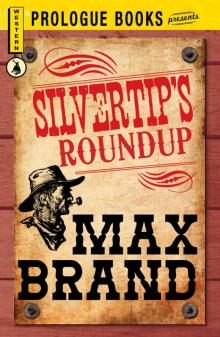 Silvertip's Roundup
Silvertip's Roundup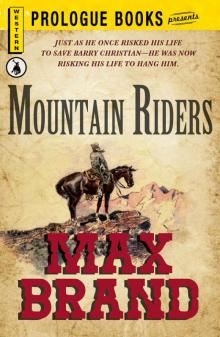 Mountain Riders
Mountain Riders Silvertip (1942)
Silvertip (1942)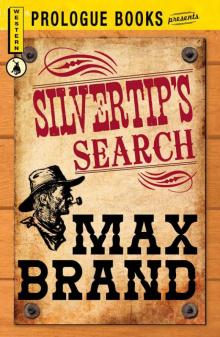 Silvertip's Search
Silvertip's Search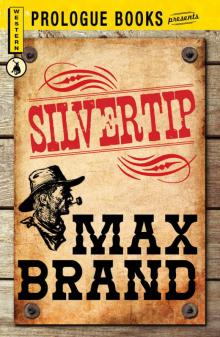 Silvertip
Silvertip Bull Hunter
Bull Hunter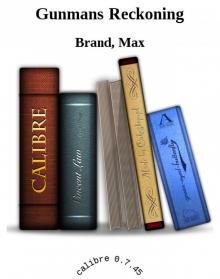 Gunmans Reckoning
Gunmans Reckoning The Seventh Man
The Seventh Man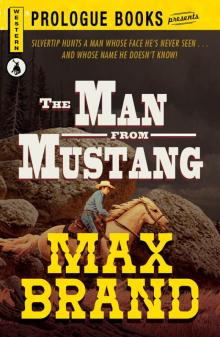 Man From Mustang
Man From Mustang Riders of the Silences
Riders of the Silences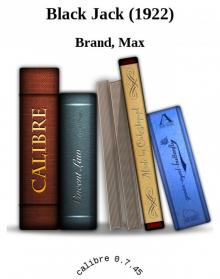 Black Jack (1922)
Black Jack (1922) Way of the Lawless
Way of the Lawless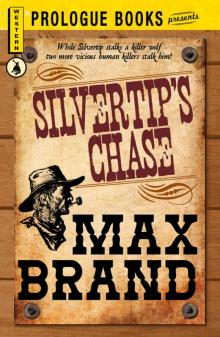 Silvertip's Chase
Silvertip's Chase Trailin
Trailin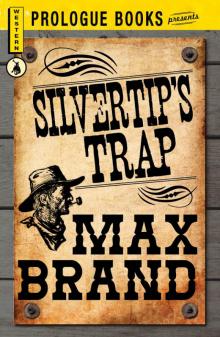 Silvertip's Trap
Silvertip's Trap Ronicky Doone (1921)
Ronicky Doone (1921) The Night Horseman
The Night Horseman the Garden Of Eden (1963)
the Garden Of Eden (1963)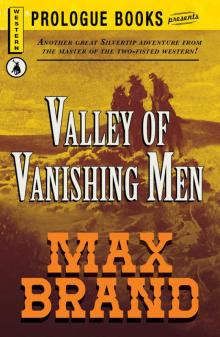 Valley of the Vanishing Men
Valley of the Vanishing Men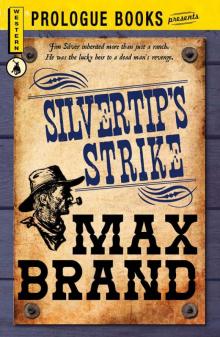 Silvertip's Strike
Silvertip's Strike Black Jack
Black Jack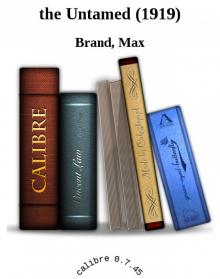 the Untamed (1919)
the Untamed (1919) Way Of the Lawless (1921)
Way Of the Lawless (1921) The Untamed
The Untamed